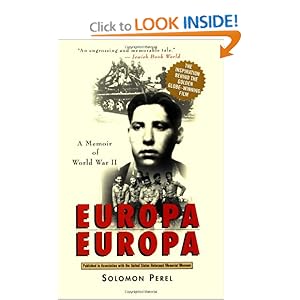Movie poster. (Source: Amazon.com)
Europa, Europa is a mainstream historical drama from the 1990s. It tells the “true” story of Salomon Perel, a young Jewish man trying to survive during World War II who eventually becomes a Nazi solider. The movie is meant to appeal to a mass audience, and it is interesting to note that while the film was critically acclaimed in the United States, it was widely panned in Germany, where it was shot. William Collin Donahue’s article”Pretty Boys and Nasty Girls” details possible reasons for this dislike, and much of it seems to extend form the inability of the audience to sympathize with the protagonist. Solly becomes a Nazi to hide the fact that he is Jewish, and to accomplish this he must act and think like a Nazi solider. What the film then asks its audience to do is to sympathize with a Nazi, which a German audience would be extremely uncomfortable with.
Solomon Perel (left) and Marco Hofschneider as Solly (right) in Europa, Europa. (Source: Amazon.com)
The key scenes in the movie come first when Solly and his family's lives are disrupted by the events of Kristalnocht, during which his sister is killed. Solly hides naked in a barrel, and when he returns home h is wearing a Nazi uniform jacket to cover himself. This foreshadows Solly’s later induction into the ranks of the army and the Hitler Youth. Another key scene in the film is Solly’s separation form his brother while trying to flee Poland, which is in the process of being invaded. He is now alone in the world, and he then lives in a Russian orphanage for several years, where he becomes fluent in Russian. Later, after he passes himself off as a German orphan and has been recruited by the invading Germans as a translator, Solly is taken to a farmhouse where a Jewish family has been killed. Distressed and angry, he uses the gun mounted on the motorcycle he is riding in to shoot the house and set it on fire. Though his new German comrades mistake his rage and actions as anti-Jewish fervor, the reality is that Solly is angry and at war with himself. In order to survive, he must become the very thing that wants to destroy him. This theme is echoed in the scene showing his induction to the Hitler Youth, where he must take an oath to die in service to the Third Reich.
Cover for Solomon Perel's book Europa, Europa, on which the film is based. (Source: Amazon.com)
Personally, I found this film interesting, though, as Bates points out in his article, it did contain frequent nudity. The purpose of Solly’s frequent nude scenes was to portray the innocence and vulnerability of the character, however their frequency diminishes their impact. The appearance of the author of the memoir on which the film is based to assert the authenticity of the story was odd, especially in light of the fact that some of the events and situations in the film were exaggerated and in some cases completely fictional. It seems to me as a viewer as if the director was trying to justify the film, which was unnecessary. This film reflects the time in which it was made through its subject matter, which while still sensitive would not have been considered appropriate material for a film audience in earlier decades. The most telling aspect of this film, however, is its reception both in Germany and the United States.
A link to the script for Europa, Europa.



No comments:
Post a Comment